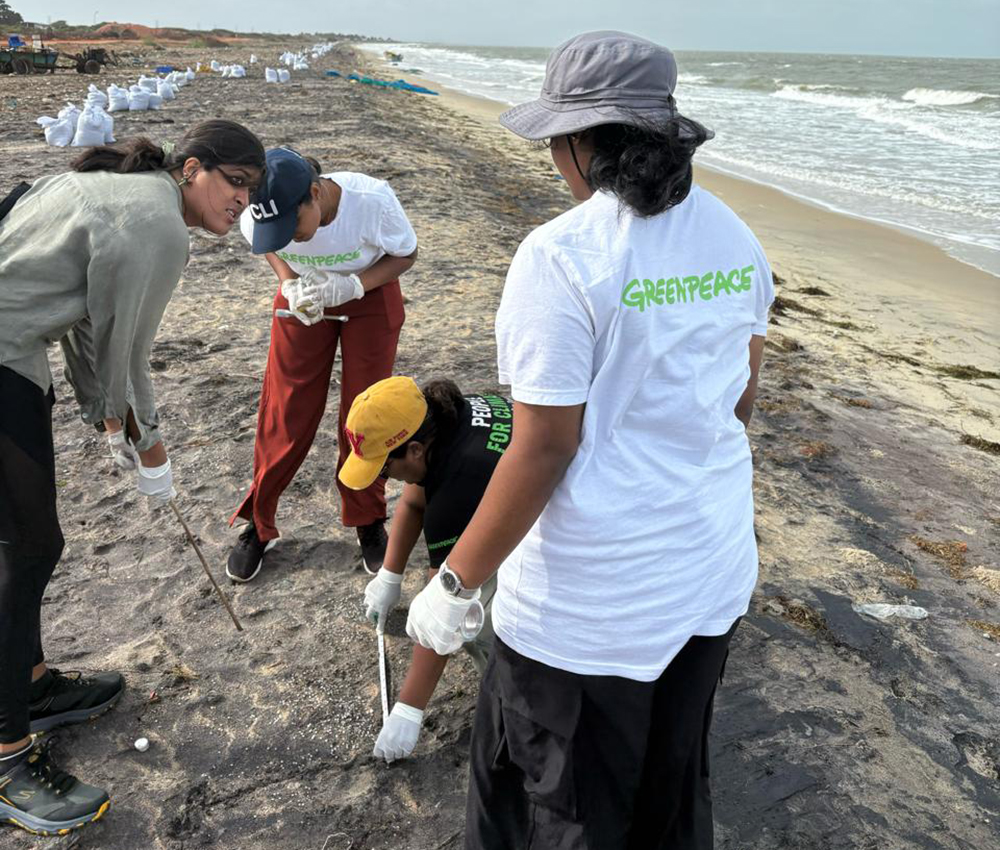MSC’s shipwreck discharges tonnes of plastic nurdles in South Asian waters

Four years after the X-Press Pearl disaster, Greenpeace South Asia deplores the recent waves of plastic pellets washing ashore on South India and Sri Lanka’s coastlines, following the shipwreck of the MSC ELSA 3 offshore Kerala on the 25th of May and the additional loss of containers from WAN HAI 503, another massive cargo vessel that has been ablaze since the 9th of June in the same waters.
This is an unprecedented situation where two container ships holding significant fuel, toxic substances and/or plastic nurdles have sunk or threaten to do so within a few weeks’ timeline in South Asian waters. The hazardous materials are being carried by monsoon weather and seasonal currents towards Kerala, Tamil Nadu and Sri Lanka’s critical ecosystems for coastal biodiversity and local communities, with already long-term expected damage for the marine environment and the fishing and tourism economies. Whereas Greenpeace and a collective group of allies have conducted sampling operations on the shores of the two Indian states and Sri Lanka to confirm the nature, coated chemicals and origins of the plastic pellets spill, all current evidence is pointing towards the MSC ELSA 3.
“Sri Lanka is still reeling from the X-Press Pearl disaster. Now we are facing yet another wave of pollution. This is not just an accident. It’s a result of regulatory failure and corporate impunity. We need stronger regional mechanisms to hold polluters accountable” said Hemantha Withanage, Chairperson, at the Centre for Environmental Justice.
Kasumi Ranasinghe, integrative researcher and facilitator, from The Biodiversity project added, “This incident shows how ecologically sensitive areas and coastal ecosystems affected by pre-existing issues are exacerbated, due to preventable shipping accidents. Nurdles may be small, but their negative impacts on our environment, communities, health, and economy go beyond basic calculations. They absorb and leach toxins, choke marine animals and persist for decades. Without serious actions intended towards closing or strictly regulating the (plastic production) tap, we are already in the process of turning our waters into a plastic soup.”
“Four years after the X Press Pearl incident, Sri Lanka’s coastlines are once again facing the threat of plastic nurdles due to another shipwreck. Alongside a group of volunteers and citizen groups, we have collected nurdles for lab testing. While the local government is conducting cleanup efforts, it is important to note that when private companies responsible for such disasters are not held fully accountable, the cost is unfairly passed on to the public.” said Anita, campaigner, Greenpeace South Asia. “This cycle of negligence and impunity must end. It is the shipping company that should pay, not the people. The Sri Lankan government must hold MSC fully accountable, both for financial liability and for the loss of biodiversity.” she added.
“Growing threat of transboundary plastic pollution: Nurdles and other hazardous materials spilled at sea do not remain within national waters but travel across borders, impacting marine ecosystems and coastal communities throughout the region. These repeated incidents expose systemic failures in regulating the transport of hazardous cargo and managing the global surge in plastic production. State authorities must take urgent action to strengthen enforcement, enhance regional cooperation, and advocate for binding international rules that hold polluters accountable and protect vulnerable communities from escalating health risks, as well as sensitive ecosystems and marine biodiversity,” said Melani Gunathilaka, Environmental activist, Climate Action Now
Greenpeace demands full transparency on the cargo manifest and calls on the Mediterranean Shipping Company (MSC) to support rapid clean-up response and independent impact assessment, as well as to engage in a comprehensive, up-to-scale compensation plan for the loss of livelihoods and biodiversity resulting from the shipwreck of the MSC ELSA 3. Whereas the company has not yet even communicated on this disaster, MSC should be reminded that liability is not a vain word.
For more information, please contact, Campaigner, Greenpeace South Asia:
Anita Perera – anita.perera@greenpeace.org
Gowshik Sathiyasiva -gowshik.sathiyasiva@greenpeace.org
